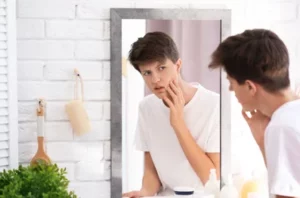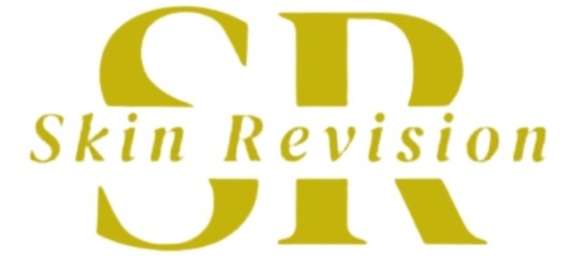Your Helpful Guide to Spotless Skin
Are you faithfully treating your acne but still seeing new breakouts? Your skin care routine could be very much to blame.
Here you’ll find 16 BAD skin care habits that can worsen acne and produce spots and pimples. You will also find expert tips to help you change those habits.
1. Try a new acne treatment every week or so.
Trying a new “on trend” and well advertised “acne prevention and remedial” treatment every other week or so can irritate your skin and cause the breakouts.
What to do instead: Give any acne home remedy treatment time to work. You want to use a product for up to 8 weeks. If you don’t see any improvement by then, you can try another product. If there is still no reward from the products and routines then you should seek professional help from a skin clinic with experience in successfully treating acne.
2. Use makeup, skin care and hair products
Some makeup, along with many skin and hair care products, contain oil or other ingredients that can cause acne breakouts. If you continue to use them, you may continue to see blemishes. Certain heavy moisturisers can be comedogenic which can clog pores and cause breakouts.
What to do instead: Use only makeup, sunscreen, skin, and hair-care products that are labeled “non-comedogenic”

3. Share makeup, makeup brushes, or makeup applicators
Acne isn’t contagious, but when you share makeup, makeup brushes, or applicators, the acne-causing bacteria, oil, and dead skin cells on other people’s skin can finish up in your makeup. When that makeup is used, you may well transfer the bacteria, oil, and dead skin cells to your skin. These may clog your pores, leading to spots and acne or cystic acne.
What to do instead: Make sure you’re the only person who uses your makeup, makeup brushes, and makeup applicators.
4. Sleep in your makeup
Even non-comedogenic makeup can cause acne if you sleep in it. Sleeping with makeup clogs pores, will cause spots and acne. Always cleanse before bedtime. Blocked pores allow bacteria to thrive and breed.
What to do instead: Remove your makeup before you go to bed. No exceptions. If you’re too tired to wash your face, use a makeup remover. If you need to use a towel of flannel make sure that is also clean with no bacteria. Often fresh cotton pads are the best.
5. Wash your face throughout the day
Washing your face several times a day can further irritate your skin or dry out your skin. Your skin does need the right balance of healthy oils to thrive and by washing your skin consistently does not allow your skin to function normally. This will lead to more breakouts.
What to do instead: Wash your face twice a day — when you wake up and before you go to bed. You’ll also want to wash your face when you finish any cardio activity that makes you perspire on your face.
6. Dry out your skin
Skin with acne is oily, so it can be tempting to apply astringent and acne treatments until your face feels dry. Do not let your skin go dry as that will cause irritation and with irritation bring spots and acne.
What to do instead: If your skin feels dry, apply a moisturiser suitable for acne-prone skin. You should speak to a professional about what is best to use, if you are not 100% sure. Apply the moisturiser twice a day, after washing your face.
You also want to avoid using astringents, rubbing alcohol, and anything else that can dry out your skin.
7. Scrub your skin clean
To get rid of spots and acne, you may be tempted to scrub your skin clean. Scrubbing, or over exfoliating, can irritate your skin, causing acne to flare. Excessive scrubbing will strip the skin’s natural oils which triggers an increase of oil production and acne breakouts.
What to do instead: Be gentle when washing your face and other skin with acne. You want to use a mild, non-comedogenic cleanser. Apply the cleanser lightly with your fingertips, using a circular motion. Gently rinse it off with warm water, using only your fingers. Then pat your skin dry with a clean, bacteria free towel.
8. Rub sweat from your skin during a workout
Using a towel to roughly rub away sweat can irritate your skin, which can cause breakouts.
What to do instead: When working out, use a clean towel to gently pat sweat from your skin.
9. Pop or squeeze breakouts
When you pop or squeeze acne, you’re likely to push pus, dead skin cells, or bacteria deeper into your skin. When this happens, you increase inflammation. This can lead to more-noticeable acne, scarring and pain.
What to do instead: Resist the temptation to pop or squeeze your spots or acne. It is understandable to want to sqeeze your spots due to them lowering your confidence and self-esteem. However, you must stick to the plan. You must do all the right things to stop your acne and spots from getting worse and spreading . Many of the good habits you should follow are mentioned here in the post.
10. Not changing pillowcases
Dirty pillowcases allow bacteria to build up. This transfers to your skin each night transferring them to your skin each night while you sleep.
What to do instead: Wash your pillowcases at least once every two weeks, Make sure the powder that is used to wash does not contain irritants
11. Touching your face
Constantly touching your face transfers dirt, oil, and bacteria, leading to flare-ups.
What to do instead: Endeavour not to touch your face regularly, especially around the areas that are prone to acne. Keep your hands washed and cleaned a few times a day. Do not wash your hands excessively.
12 Skipping sunscreen
UV rays can worsen acne scars. Non-comedogenic sunscreens offer protection without clogging pores.
What to do instead: Sun screen with a minimum sun protection value of #30, should be applied each and every day of the year. The products should be free of parabens and be non-comedogenic.
13 Unhealthy diet
High-glycemic foods, dairy, and excessive sugar can exacerbate acne.
What to do instead: A healthy diet is paramount to better overall health and this very much also applies to your skin. A well balanced healthy diet would contain all the vitamins necessary for great health such as Omega 3, D, E and C. Drinking water regularly during the day is also important.
14 Stress
Stress hormones contribute to breakouts. Prioritize stress management.
What to do instead: Stress triggers the release of hormones like cortisol, which can increase oil production and inflammation in the skin, leading to clogged pores and acne breakouts. Additionally, stress compromises the immune system, making the skin more susceptible to infections which can exacerbate existing acne issues. Managing stress helps maintain hormonal balance, reduces inflammation, and supports a healthier immune response, crucial for achieving spot-free skin.
15 Lack of sleep
Lack of sleep disrupts hormone balance, increasing stress hormones and inflammation. This leade to heightened oil production and delayed skin healing which worsens acne. Quality sleep supports skin repair, regulates hormones, and boosts immune function which is crucial for preventing breakouts and promoting clearer skin.
What to do instead: Be consistent with your sleep patterns. Research has proven that 8 hours sleep per night allows your body including your skin to function at its optimum each and every day.
16 Ignoring Professional Help
Even if you do not carry out any of these bad habits and the spots and acne are still showing on your skin, there is only one solution. You should seek advice from a professional in order to begin more medical type treatments.
What to do instead: Consulting skin repair and acne clinic such as Skin Revision in Beaconsfield, Buckinghamshire UK is an important step to take.
Key Practices for Acne-Free Skin
- Gentle cleansing: Use a mild cleanser twice a day to remove impurities without stripping natural oils.
- Moisturise: Opt for non-comedogenic, lightweight moisturizers to keep the skin hydrated without clogging pores.
- Regular gentle exfoliation: Gently exfoliate to remove dead skin cells and prevent pore blockages.
- Healthy diet: Incorporate fruits, vegetables, and omega-3 fatty acids for healthier skin.
- Hydration: Drink plenty of water to flush out toxins and maintain skin hydration.
- Take makeup off: Use clean brushes and applicators to remove makeup each night. Dont share brushes
- Hands-off approach: Resist the urge to touch your face frequently to avoid transferring bacteria.
- Manage stress: Engage in stress-relieving activities like yoga, meditation, or hobbies you enjoy.
- Professional guidance: Consult a skincare professional such as Skin Revision for advice and treatments tailored to your skin type.
At Skin Revision, we emphasise holistic skincare practices to achieve and maintain healthy, clear acne free skin. However, by avoiding these 16 habits while embracing these essential practices can significantly improve your skin’s health, feel and appearance.
For personalised advice and treatments, visit Skin Revision in Beaconsfield, UK, and let us help you achieve your skincare goals.




